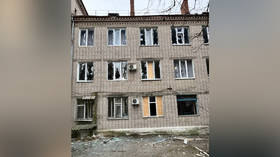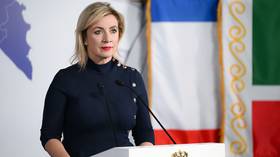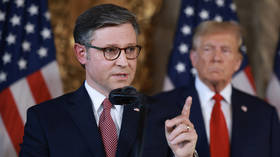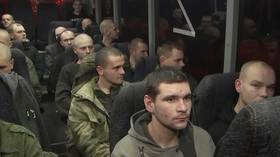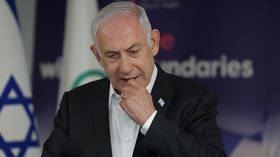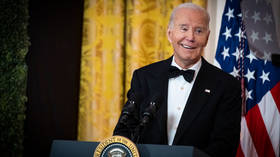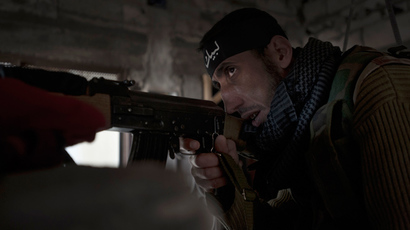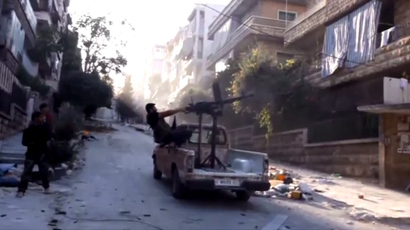Battle near Syrian chemical facility endangers disarmament process
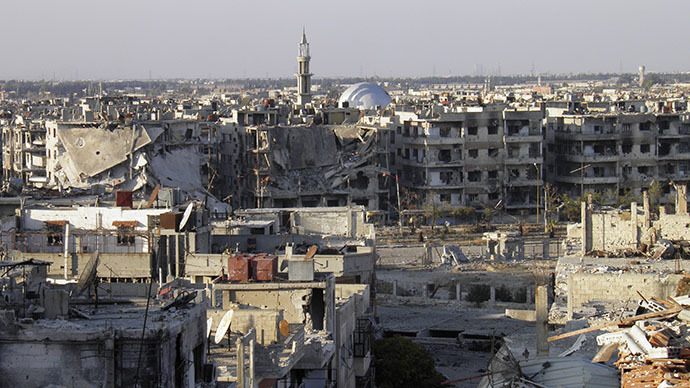
A heated battle is underway just meters away from a chemical facility in Syria, the Russian foreign ministry has warned, accusing the Islamist rebels of attempts to hamper international efforts to dispose of the deadly weapons.
“The fighting between the Syrian government troops and militants from the Al-Nusra Front and the Army of Islam goes on just about 100 meters away from a chemical facility in Sukkari neighborhood in Homs Governorate,” the statement by the Foreign Ministry said.
The endangered facility is used to store chemical agents due to be moved and utilized outside Syria as part of the international plan to destroy the chemical arsenals of President Bashar Assad, the statement stressed.
According to the ministry, the joint mission of Organization for the Prohibition of Chemical Weapons and United Nations in Damascus has already been notified of the events in Sukkari by the Syrian authorities.
“Moscow is deeply concerned by those reports. We strongly condemn the provocative actions aimed at disrupting the schedule of disposal of toxic substances and their precursors from Syria,” the statement said.
Russia has urged all international players with influence over the anti-government armed groups in the country to put pressure on them in order to create the “necessary conditions for the successful implementation of the process of Syrian chemical disarmament.”
The Foreign Ministry pointed out the involvement of the Army of Islam militant group, which is part of the Islamic Front, in the Sukkari neighborhood fighting.
“Some of our partners in the Syrian settlement process labeled the group as ‘moderate’ forces, saying that they may well participate in the Geneva 2 International Peace Conference,” the statement said. “But the participation of Army of Islam fighters together with Al-Nusra Front in battle with government forces near Homs convincingly suggests what these ‘moderate’ Islamists really are.”
West starts seeing Assad as lesser evil – Lavrov
Also on Friday, Russia’s foreign minister, Sergey Lavrov, said that he was witnessing a shift in attitude towards the Islamist rebels in Syria among the Western diplomats.
“Not only in private meetings, but also in public comments, the idea is occurring to some Western colleagues that... Assad remaining in office is less of a threat for Syria than a takeover of the country by the terrorists,” Lavrov told RIA-Novosti news agency in an interview.
He added that many in the West are alarmed by “jihadists and terrorists rapidly increasing their influence in Syria, seizing territory and immediately establishing Sharia (Islamic) law there, massacring the minorities, burning people alive for simply being of different faith.”
“According to experts from various countries, a significant part of the [Syrian] population – around 50 per cent – see Assad as a guarantee of their interests and security. And it’s not only the minorities (Alawites, Druze and Christians), but many Sunnis, especially, those who created their businesses under the current regime and fear that any new government will simply take it from them,” Lavrov said.
Assad has no plans of abandoning Syria and even considers running for president again next year, the minister said, but added that the future of the country’s political system must be decided “by the Syrians on the basis of mutual content between the government and the opposition.”
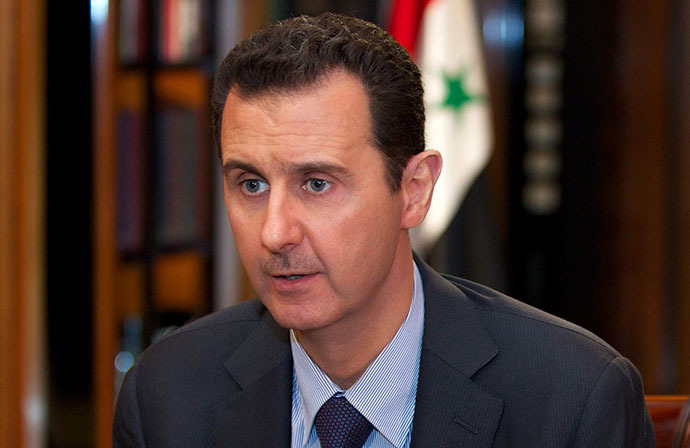
The minister expressed hope that the sides will start the Geneva 2 peace conference on January 22, 2014 “not with discussing personalities, but confirming that they want to see Syria as a sovereign state with territorial integrity, where all, regardless of racial, ethnic, religious and other differences, will feel safe, comfortable and in equal.”
The preparations for the upcoming event are in full swing, but there are some important issues which must be resolved before the government and opposition sit down at the negotiations table, he said.
“The main problem now is to understand how representative the delegation from the opposition will be as we’re getting more and more contradictory signals about it,” Lavrov stressed.
The Syrian National Coalition and Free Syrian Army, which were positioned by Russia’s Western partners as legitimate representatives of the Syrian people, are rapidly losing ground to the jihadist, often Al-Qaeda linked, groups from foreign countries, he explained.
The second key issue is the participation of external players in the talks as Russia believes that all states that influence the situation in Syria, like Iran and Saudi Arabia, must be invited.
Britain to help destroy Syrian chemical arms
Meanwhile, Britain has decided to join the international effort to destroy the chemical weapons of President Assad. The UK will provide a navy ship to secure the removal of chemical weapons from Syria and will also destroy 150 tons of non-explosive industrial grade chemicals on its soil.
The military vessel will “assist in the safety and security of Danish and Norwegian cargo ships in international waters when removing the entire chemical stockpile from Syria by sea," a Foreign Office spokesman in cited as saying by AFP.
Britain has also agreed to provide specialist equipment to the US in the hydrolysis of the most sensitive chemicals before their final destruction aboard an American ship in international waters.
The contribution is part of an international operation to destroy Syria's stockpile of deadly chemicals following a deal struck between President Bashar al-Assad's government, the United States and Russia as Syria stood on a brink on direct foreign military intervention earlier this year.


